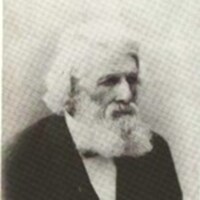Wilson Bruce Evans
Title
Wilson Bruce Evans
Description
Wilson Bruce Evans was a leading member of Oberlin's 19th century African American community. He and his brother, Henry Evans, moved their families to Oberlin from North Carolina in 1854. The two men ran a successful carpentry business in town. Wilson Bruce Evans was a staunch abolitionist and his house served as a stop on the Underground Railroad. Both he and his brother participated in the 1858 Oberlin-Wellington Rescue and Wilson Bruce fought in the Union army in the Civil War.
Birth Date
1824
Birthplace
Fayetteville, North Carolina
Death Date
1898
Occupation
Carpenter
Biographical Text
Wilson Bruce Evans was a light-skinned African American born free in Fayetteville, North Carolina in 1824. In 1854, Evans and his brother Henry Evans moved their wives and children to Oberlin. Their sister, Delilah, had moved to Oberlin with her husband, John Copeland, in 1843, and the Evans brothers were attracted to a community that seemed to offer a safe space for people of color.
In the 1850s, Oberlin had a thriving free Black community and Wilson Bruce Evans quickly became one of its leaders. He and his brother established a cabinet-making and carpentry shop on East Mill Street (now Vine Street). Wilson Bruce Evans was an abolitionist and his house--which he and his brother built between 1854 and 1856--served as a regular stop on the Underground Railroad. In 1858, both Wilson Bruce and Henry Evans participated in rescuing John Price, a 17-year old escapee from slavery who had been living in Oberlin, after he was captured by slave catchers. They were both arrested for their part in what became known as the Oberlin-Wellington Rescue.
Wilson Bruce Evans fought in the Civil War, assigned to a white Union Army unit even though he identified as "colored" when he registered for the draft.
He returned to Oberlin after the Civil War and died in 1898. He is buried in Oberlin's Westwood Cemetery. After the Civil War, Wilson Bruce Evans returned to Oberlin and continued his career as a furniture maker. He also began making caskets and was listed as an "undertaker" in the 1887 City Directory. Two of his daughters graduated from Oberlin College.
Evans died in 1898. He and his wife, Sarah, are buried in Oberlin's Westwood Cemetery. The home he built in the 1850s still belongs to his descendants; it is now on the National Register of Historic Places and will soon be open to the public for tours.
In the 1850s, Oberlin had a thriving free Black community and Wilson Bruce Evans quickly became one of its leaders. He and his brother established a cabinet-making and carpentry shop on East Mill Street (now Vine Street). Wilson Bruce Evans was an abolitionist and his house--which he and his brother built between 1854 and 1856--served as a regular stop on the Underground Railroad. In 1858, both Wilson Bruce and Henry Evans participated in rescuing John Price, a 17-year old escapee from slavery who had been living in Oberlin, after he was captured by slave catchers. They were both arrested for their part in what became known as the Oberlin-Wellington Rescue.
Wilson Bruce Evans fought in the Civil War, assigned to a white Union Army unit even though he identified as "colored" when he registered for the draft.
He returned to Oberlin after the Civil War and died in 1898. He is buried in Oberlin's Westwood Cemetery. After the Civil War, Wilson Bruce Evans returned to Oberlin and continued his career as a furniture maker. He also began making caskets and was listed as an "undertaker" in the 1887 City Directory. Two of his daughters graduated from Oberlin College.
Evans died in 1898. He and his wife, Sarah, are buried in Oberlin's Westwood Cemetery. The home he built in the 1850s still belongs to his descendants; it is now on the National Register of Historic Places and will soon be open to the public for tours.
Citation
“Wilson Bruce Evans,” Oberlin Community History Hub, accessed May 2, 2024, https://megansmitchell.org/DH694/items/show/193.

